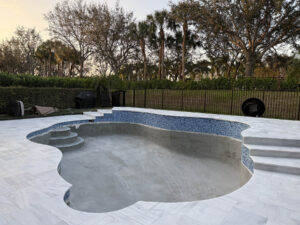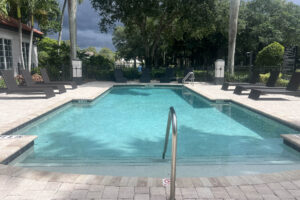Did you know that a single duck can produce up to a pound of droppings per week? While ducks might seem like charming visitors, when they decide to make your swimming pool their hangout spot, they bring more than just their cute waddles—they bring a slew of germs and debris that you don’t want in your pool!
It’s crucial to address their invasion swiftly to keep your swimming waters clean and safe for everyone. Let’s explore effective strategies to prevent ducks from turning your beautiful pool into their personal pond.
Why Are Ducks A Danger In The Pool?
While ducks are enjoyable to watch in their natural habitat, their presence in your pool is less than desirable due to the potential health risks and maintenance challenges they introduce.
Let’s explore why keeping ducks out of your pool is essential for maintaining its cleanliness and safety. For comprehensive solutions, consider consulting a professional pool service in Jupiter, FL.
1. Health Risks from Droppings: Ducks can produce significant amounts of droppings which contain harmful bacteria and parasites, risking the health of swimmers. Gross!
2. Persistent Presence: Ducks often return to pools repeatedly as part of their natural behavior, making it challenging to keep them away permanently without effective deterrent strategies.
3. Water Contamination: Duck droppings introduce dangerous fecal parasites into the pool, which can disrupt the cleanliness and safety of the water.
4. Disruption of Pool Chemistry: Ducks swimming in your pool can disturb the water chemistry, making it harder to maintain the proper balance needed for a clean and safe swimming environment.
5. Spread of Diseases: Ducks can carry and spread diseases like salmonella, e-coli, cryptosporidium, and campylobacter through their feces, which can contaminate pool water and turn pool maintenance into a difficult task.
Ducks may look majestic gliding across a natural pond, but they can wreak havoc and pose a serious safety hazard when they enter your swimming pool. Even if chlorination combats most bacterial growths, some microbes can still sustain challenges and live for a week in a well-looked-after body of water.
How You Can Prevent Ducks From Entering The Pool!
1. Use a Pool Cover: Regular chemical balancing is a critical part of pool maintenance in Jupiter, FL, but all efforts can be undermined by ducks. A pool cover not only maintains clean, germ-free water by shielding it from duck droppings but also blocks dust, debris, and leaves from disrupting the water chemistry.
2. Deploy Inflatables: Brightly colored pool toys and floaties, like an inflatable shark or alligator, can intimidate ducks due to their vivid colors and movement. Their presence in the water mimics potential threats, keeping ducks at a distance.
3. Operate a Pool Vacuum: Activating your pool vacuum often causes water movement that deters ducks, who prefer to land in still waters. Continuous ripples from the vacuum make the pool less inviting to them. This is a great way of keeping the ducks from wading in the pool while at the same time keeping the pool clean.
4. Install Garden Sprinklers: Ducks are deterred by unexpected strong water sprays. Setting up sprinklers around your pool to activate intermittently can startle ducks and discourage them from settling.
5. Maintain Regular Pool Cleaning: A pool infested with algae blooms is attractive to ducks. Ensuring your pool is free from algae and debris through pool maintenance in Jupiter, FL makes it unattractive for ducks looking for a place to relax.
6. Have a Pet Dog: Ducks typically avoid areas with predators like dogs. Having a dog patrol around the pool area can be an effective deterrent.
7. Eliminate Nearby Food Sources: Remove or reduce trees and bushes that produce fruits, nuts, or berries close to the pool area. These attract birds and ducks, increasing the likelihood of them visiting your pool.
8. Use Duck Repellents: These products alter the surface tension of the water, making it difficult for ducks to float comfortably. While they do not harm ducks, they make the water environment inhospitable for them. Consult with a professional pool service for advice on the best duck repellent for your pool and how to apply it correctly to ensure even distribution without affecting water quality.
Protect The Environment And Wildlife:
In addition to maintaining pool cleanliness, it’s crucial to consider the impact on local wildlife. Chlorinated water can be harmful to ducks, as it poses a risk to their delicate kidney function. Ducks may inadvertently ingest chlorinated water while swimming, which can lead to serious health issues or permanent damage to their kidneys.
By implementing these suggested measures to keep ducks out of your pool, you not only maintain its hygiene but also protect these birds from potential harm. This approach helps safeguard our local wildlife while ensuring your pool remains a safe and clean environment for everyone to enjoy.



